Related Research Articles

Henri Farman was a British-French aviator and aircraft designer and manufacturer with his brother Maurice Farman. Before dedicating himself to aviation he gained fame as a sportsman, specifically in cycling and motor racing. Henri took French nationality in 1937.

Marshall Walter "Major" Taylor was an African-American professional cyclist. Even by modern cycling standards, Taylor could be considered the greatest American sprinter of all time.

John Winthrop Noble was an American film director and screenwriter during the silent era.

Evelyn Brent was an American film and stage actress.

Wesley William Coe Jr., sometimes listed as William Wesley Coe Jr., was an American track and field athlete who competed principally in the shot put and also in the hammer throw, discus throw, and tug of war.
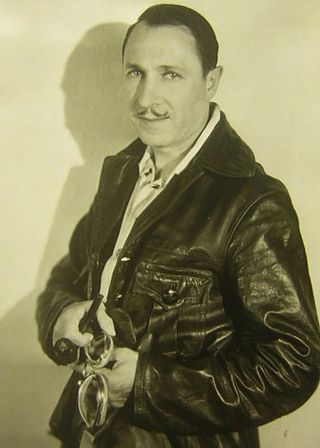
Armand David Kali(s)z was an American stage and film actor of the silent film and early sound period of the 1930s. Prior to that, he was an actor in vaudeville and on the legitimate stage.
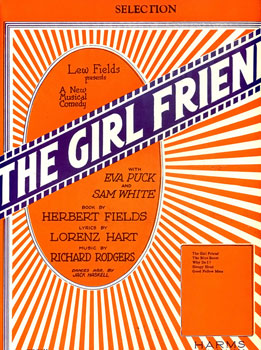
The Girl Friend is a musical comedy with music by Richard Rodgers, lyrics by Lorenz Hart and book by Herbert Fields. This was the longest running show for the trio to that date.

Emma Dunn was an English actress. After starting her acting career on stage in London, she became known for her works in numerous films and Broadway productions.
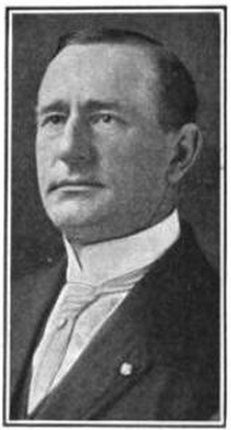
Charles Otis Bemies was an American football, basketball, and baseball coach and Presbyterian minister. He became acquainted with James Naismith while studying at Springfield College in the late 1880s. While serving as the athletic director at Geneva College, he organized the first college basketball team in 1892. He graduated from the Western Theological Seminary and was ordained as a Presbyterian minister in 1897. From 1899 to 1901, he served as the first basketball and second football coach at Michigan Agricultural College. After retiring from coaching, Bemies served for many years as a Presbyterian minister and evangelist in rural Pennsylvania. He was also active with YMCA, serving with that organization in Russia in 1918 and in South Dakota in the early 1920s. Bemies lived in Minneapolis, Minnesota, in his later years and died there in 1948. He was posthumously inducted into the Beaver County Hall of Fame in 1992.
Louis Campbell-Tipton was an American composer.

Harry J. Beresford was an English-born actor on the American stage and in motion pictures. He used the professional name Harry J. Morgan early in his career.

Beverly Francis Carradine was an American Methodist minister and a leading evangelist for the holiness movement. He was a productive author, writing primarily on the subject of sanctification. The patriarch of the Carradine family, he was the grandfather of actor John Carradine and great-grandfather of actors David, Keith, and Robert Carradine.

Frederick William "Pa" Henninger was an American businessman and football player and coach. He played football for the University of Michigan from 1893 to 1896 and was the captain of the 1895 team that outscored their opponents by a combined score of 266 to 14. After receiving his degree, he was an assistant football coach at Michigan from 1897 to 1899 and 1902. He worked as an engineer for the Detroit United Railway and later had a successful career as a manufacturer in Detroit.
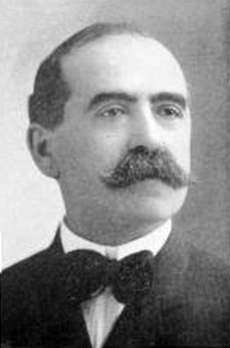
Morris Meyerfeld Jr. was a German-born American entrepreneur who through the Orpheum Circuit dominated the vaudeville market west of the Mississippi for nearly two decades.
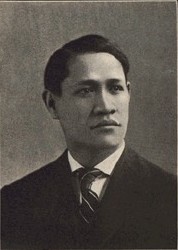
Louis Keouli Thompson, better known by his stage name Segis Luvaun, was a Hawaiian singer and musician and the reported King of Ukulele Players. Thompson, native to Hawai'i, claimed United States citizenship when Hawaii was annexed by the United States as a territory in 1898. He performed much of his life, first touring the United States and later throughout Scandinavia and Europe, many times for Royalty.

John James Henry Sturmey (1857–1930), known as Henry Sturmey, is best remembered as the inventor with James Archer of the Sturmey-Archer three-speed hub for bicycles, but he was a technical editor and journalist heavily involved as a pioneer of the cycling and automotive industries. Born at Norton-sub-Hamdon, Somerset, on 28 February 1857 he died aged 72 at his home in Coventry on 8 January 1930.
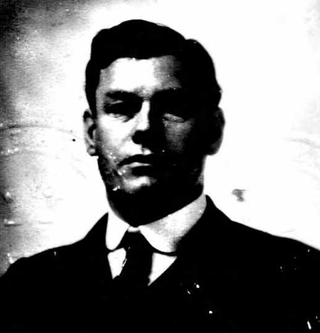
William Van Bergen Van Dyck was an American football player and coach, electrical engineer, and businessman. He played college football at Rutgers College in 1893 and 1894 and served as the first full-time head coach of the Rutgers Scarlet Knights football team during the 1898 and 1899 seasons. He was associated with the International General Electric Company from 1900 until his retirement in 1945. He founded the General Electric subsidiary in Brazil and participated in the lighting of the Strait of Magellan in 1906.
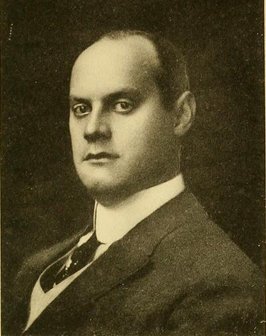
John Chester Backus Pendleton was an American football coach and stockbroker from Baltimore, Maryland. He was the head coach of the Rutgers Scarlet Knights football team from 1896 to 1897. He later became a member of the Baltimore Stock Exchange in 1897 and was employed thereafter as a stockbroker in that city.
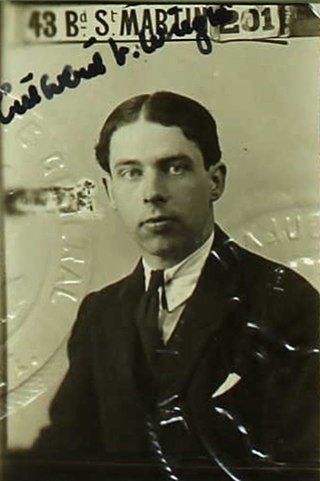
Cuthbert Vail Wright was an American literary critic, writer, poet, and educator.
John Selbini, was an American-born British trick cyclist, acrobat and entertainer, who established The Selbinis, one of the most successful family acts performing in British music halls and internationally between the 1880s and the First World War.
References
- 1 2 3 4 5 6 Tindal, Marcus (December 1897). "The Tramp Cyclist". Pearson's Magazine . Vol. 4, no. 24.
- ↑ "LONDON VARIETY STAGE. THE PALACE". The Stage . No. 848. 17 June 1897. p. 14 – via Findmypast.
Mr. William E. Ritchie gave as smart and clever a comedy cycling act as we have seen yet.
- ↑ "Passport application by William E. Ritchie at U.S. Embassy in London for the purpose of travelling on the Continent", 27 May 1898. National Archives and Records Administration (NARA); Washington D.C.; NARA Series: Emergency Passport Applications (Issued Abroad), 1877-1907; Roll #: 45; Volume #: Volume 085: England - via Ancestry.com.
- ↑ "Passport application by William E. Ritchie at U.S. Consulate in Budapest for the purpose of travelling in Europe", 20 Feb 1901. National Archives and Records Administration (NARA); Washington D.C.; NARA Series: Emergency Passport Applications (Issued Abroad), 1877-1907; Roll #: 25; Volume #: Volume 042: Austria - via Ancestry.com.
- ↑ "Passport application by William E. Ritchie at U.S. Consulate General in Barcelona", 14 May 1903. National Archives and Records Administration (NARA); Washington D.C.; NARA Series: Emergency Passport Applications (Issued Abroad), 1877-1907; Roll #: 21; Volume #: Volume 035: Kingston, Jamaica to Montreal, Canada - via Ancestry.com.
- ↑ "Passport application by William E. Ritchie at U.S. Embassy in Berlin for the purpose of entering Russia", 18 March 1911. National Archives and Records Administration (NARA); Washington D.C.; NARA Series: General Emergency Passport Applications, 1907-1923; Volume #: Volume 130: France to Korea - via Ancestry.com.
- 1 2 3 "WILLIAM E. RITCHIE, TRICK BICYCLIST, 71. Vaudeville and Revue Artist Dies Here - Had Played With Will Rogers, W. C. Fields. IN STAGE TEAM WITH WIFE. He and May Villion on Tour for Many Years - Were in 'The Follies' of 1917-1918". New York Times . 13 May 1943. p. 21. Retrieved 2 August 2023.
- ↑ "Death of Billie Ritchie". The Stage . No. 2, 106. 28 July 1921. p. 10 – via Findmypast.
The deceased gentleman must not, of course, be confused with Billy Ritchie, the well-known tramp cyclist, who is happily alive and well.
- 1 2 "1943 Death of William Ritchie, database 'New York, New York City Municipal Deaths, 1795-1949'". FamilySearch . Retrieved 31 July 2023.
- ↑ "That Cycling Tramp". Cycling. Vol. XIV, no. 351. 9 October 1897 – via Findmypast.
Ritchie's wheel is a Cleveland, bought and paid for, fitted with wood rims, and American single tube puncture proof tires, with five thicknesses on the tread
- ↑ "Cleveland Model 69 Bicycle, 1899". National Museum of American History . Smithsonian Institution . Retrieved 1 August 2023.
- ↑ "Ritchie, Tramp Cyclist (1899)". British Film Institute . Retrieved 1 August 2023.
- ↑ "Ritchie the Tramp Cyclist (1899)". British Film Institute . Retrieved 1 August 2023.
- 1 2 "That Cycling Tramp". Cycling. Vol. XIV, no. 351. 9 October 1897 – via Findmypast.
He has worked for a time in combination with W. H. Barber, who is at present doing some very smart tricks at the Alhambra, along with Madeline Kilpatrick.
- 1 2 3 Sime (11 August 1906). "Barber-Ritchie Trio. Bicycle Riding. New York Roof". Variety . Vol. III, no. 9. p. 6. Retrieved 31 July 2023.
The trio is composed of W. E. Ritchie, formerly the tramp of 'In Gay New York'; Barber, a trick rider from the old days, and May Villion of the riding family of that name.
- ↑ "LOOPING THE LOOP". The Daily Telegraph . No. 7947. New South Wales, Australia. 23 November 1904. p. 5. Retrieved 2 August 2023– via National Library of Australia.
- ↑ "NEWPORT EMPIRE, CHARLES STREET". South Wales Daily. 2 November 1901. p. 1 – via Findmypast.
From the Hippodrome, London [...] RITCHIE DUO, including W. E. RITCHIE.
- ↑ "Camberwell Palace of Varieties, CAMBERWELL GREEN". South London Observer. 1 June 1904. p. 5 – via Findmypast.
The Karno Trio, Ritchie Duo, [...] George Formby.
- ↑ "The Four Ritchies". Vaudeville America. Keith's Theatre, Cincinnati, OH. 1912. Retrieved 2 August 2023.
Cyclists. 10 min., full stage. Act consists principally of the introduction of a large number of freak machines. Roars of laughter throughout, and a splendid closing act. Went big.